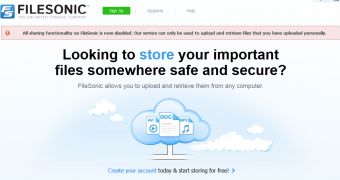The owners of file-sharing websites are taking drastic measures to make sure they don’t end up just like Megaupload and its owners, blocking their sites to certain countries and even limiting their functionality.
After the world and other file-sharing websites witnessed the power of US law enforcement agencies when they managed to close down Megaupload and arrest some of the people that were running it, Anonymous hackers launched massive distributed denial of service attacks against government institutions, anti-piracy outfits and representatives of the media industry.
While the attack was ongoing, file-sharing sites such as Upload.to and FileSonic immediately took measures.
According to TorrentFreak, Upload.to blocked all US Internet users from accessing the site and even though they didn’t state their reasons for doing so, the timing indicated that the measure was taken to make sure its owners don’t have the same fate as the ones operating Megaupload.
Filesonic on the other hand, posted a message on the main page of the site, notifying customers that they can’t access anything else, except for their own content.
“All sharing functionality on FileSonic is now disabled. Our service can only be used to upload and retrieve files that you have uploaded personally,” reads the announcement on the homepage.
This is not the only measure taken by FileSonic. Until recently, the cyberlocker offered an amount of money for users when their files were downloaded by others, in some type of reward program.
TorrentFreak reports that just before they revealed the fact that sharing is no longer possible, they also interrupted the rewards program. Most of their users fear that all the money generated by the program is lost.
After being targeted by the authorities and copyright holders, FileSonic, apparently based in Hong Kong just like Megaupload, has been making some important decisions with the purpose of clearing their name.
In December 2011, they partnered up with Vobile, a content identification provider that supposedly checked all the content before being uploaded to their services.

 14 DAY TRIAL //
14 DAY TRIAL //